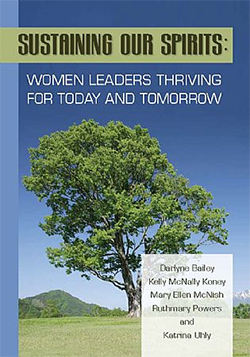
The NASW Press book, Sustaining Our Spirits: Women Leaders Thriving for Today and Tomorrow, offers an unconventional exploration of women in leadership. Unlike traditional how-to books, the authors highlight the interconnectedness among women, leadership, and the role of spirituality.
The authors are women leaders from different sectors and locations: Darlyne Bailey, Kelly McNally Koney, Mary Ellen McNish, Ruthmary Powers, and Katrina Uhly.
In the text’s prologue, Bailey highlights a personal note from Paulo Freire, famed Brazilian philosopher, educator and activist, about his advice for her as a first-time social work dean.
Freire said, “Don’t worry, Darlyne. A leader does not have to have all of the answers. Rather, a good leader has to make sure that all the right questions are on the table.”
“Once he told me that, my spirits were lifted,” said Bailey, PhD., LISW, professor and now dean emeritus at the Graduate School of Social Work and Social Research and director of the Social Justice Initiative and special assistant to the president for Community Partnerships at Bryn Mawr College in Pennsylvania.
“I knew I could do that,” Bailey said. “I had so many questions! That became the impetus and process for the book — questioning, exploring, discerning, and acting — elements key to effective leadership.”
Gathering content for the book was a serious process that evolved from the authors’ numerous retreats. These getaways lasted from 1994 until the book’s publication in 2008.
During that time, the authors employed a “snowball” approach to finding leaders to share their perspectives through lived experiences. Interviewees suggested interviewees, resulting in 50-plus women who generously gave multiple hours with an author.
“It was definitely not a randomized sample,” Bailey said. “These exchanges were relationship-based and crossed all sectors.”
The resultant book highlights the discovered tenets of leadership: authenticity, humility, empathy, courage, compassion, faith, and love.
“These tenets well-served me to the point that I teach and continue to conduct research around them,” Bailey said